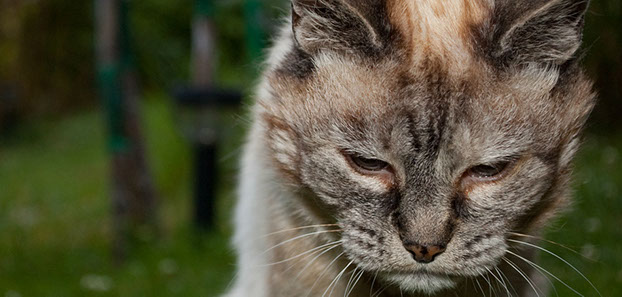Much like humans, as cats get older they change both physically and behaviorally. Below are certain physical and behavioral changes that you can expect to see from your aging cat.
• As a cat ages he or she may lose weight due to a decreased ability to digest and absorb fat.
• Senior cats may become dehydrated and constipated, as they often fail to drink enough
water. Constipation can also be caused by a slower digestive system and arthritis or
anal-gland problems. It may even signal serious disease and should be discussed with a
veterinarian.
• A cat may get grey or white hair, especially on their face. They may experience thinning and
texture changes in their hair as well. Sudden changes in a cat’s coat can also signify
nutritional deficiencies and should be discussed with a veterinarian.
• An aging cat’s skin can become thinner, drier and less elastic, making him or her more prone
to injury and infections. Good nutrition is important and brushing your cat will help to
stimulate the oil gland that will lubricate the skin and coat. Grooming also allows you to
check for any lumps, bumps, or non-healing sores.
• Older cats will not use their scratching posts nearly as often as younger cats. This is because
with age a cat’s claws become drier and more brittle. Again, good nutrition along with
frequent nail trimming will help to keep your cat’s claws healthy.
• Dental disease is also common, especially gum disease, and can cause life-threatening
complications. This can be minimized with routine dental care including brushing your cat’s
teeth.
• Cats may also develop arthritis as they age. This may cause them to be stiff, sore and
reluctant to move around. If you notice that your cat is experiencing these signs please talk
to your vet.
• It is important to encourage your senior cat to exercise, as older cats may lose muscle mass
and tone. If your cat is unable to exercise, massaging his or her joints and muscles everyday
may help to keep these joints and muscles flexible.
• Hearing loss is also common in older cats, although it may go unnoticed. If your cat often
responds to you with a swat or a bite he or she may be losing their hearing. These reactions
often occur when a cat is startled therefore reactions like this may signify a cat’s inability to
hear you as you approach them. When a cat loses his or her hearing due to aging it is usually
permanent.
• Loss of vision may also occur in older cats. Common signs of vision loss include bumping in
to things and a lack of interest in moving objects. Older cats’ eyes often become cloudy
however this does not usually have any effect on vision. If any sudden changes are noticed
in the appearance of the eyes or your cat’s behavior please contact your vet.
• Older cats are often less adept at handling stress. This means that things like bringing home
a new kitten or puppy may not be the best idea.
• An aging cat may become crabby. However, crabbiness in the form of aggression can signify
something else such as a response to pain or fear. Behavior such as this may alert you to
other illnesses or old age issues such as loss of hearing or vision. If your cat becomes
aggressive please consult your veterinarian.
• One of the most common problems with senior cats is inappropriate elimination. Older cats may make a mess outside of the cat litter box and even spray. This can be due to a medical problem as well as stress.
Older cats have to use their litter boxes more often due to changes in their digestive tracts and urinary systems. This means that you may have to clean the litter box more frequently and accommodate your senior cat by lowering the sides of the litter box and having more than one box throughout the house if mobility is a problem. It is important to understand that this is due to aging and most likely not a behavioral issue. Therefore be patient with your senior cat and do not scorn him or her for occasional accidents outside of the litter box. In this case, a vet check may also be a good idea.
Older cats may also develop altered sleep-awake cycles. In order to help with this try playing with your cat before bed time as well as changing his or her feeding time.
It is important to monitor your cat more closely as he or she ages. Changes in physical appearance and behavior may not just be signs of old age but can also signify more serious diseases and issues. If you have any concerns or see any sudden changes in your cat’s appearance or behavior please consult a veterinarian.
Image by Diti the penguin



